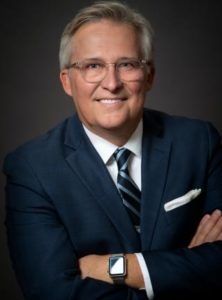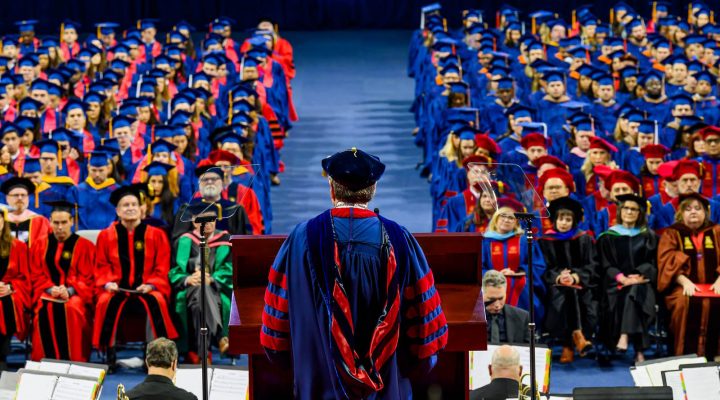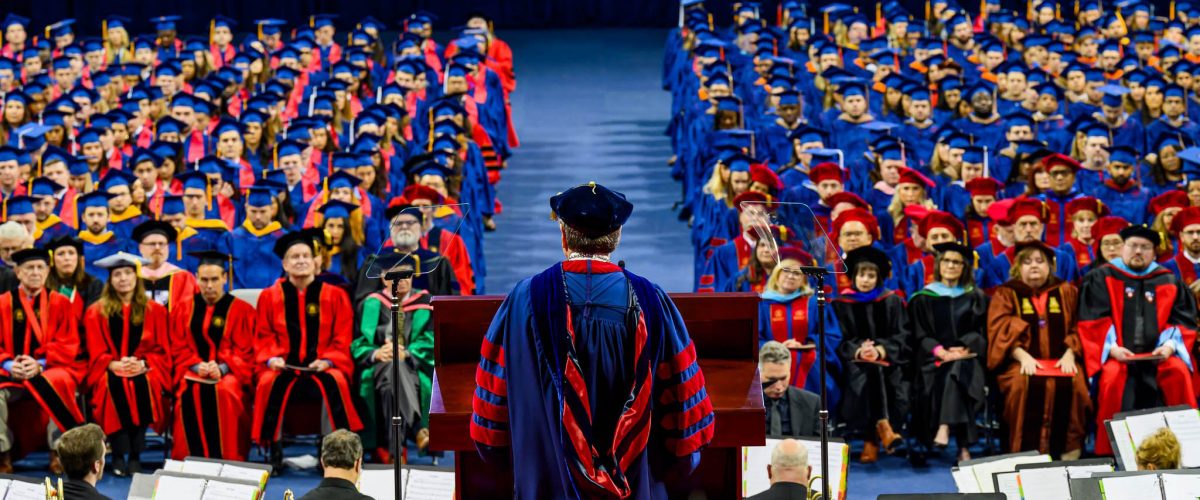Editor’s note: The following column was adapted from a message delivered to graduates of Perkins School of Theology at Southern Methodist University May 2.
So, this is it. We are here to bid you farewell and send you forth. You’ve spent, some of you, three years studying at the feet of masters. You came brimming with hope, and now you may be leaving with more fear than you expected.
In John 15:9-17, we find what is called the Farewell Discourses of Jesus.

George Mason
It’s that passage that begins: “As the Father has loved me, so I have loved you; abide in my love. If you keep my commandments, you will abide in my love, just as I have kept my Father’s commandments and abide in his love.”
We could just as easily call these verses the Sending Forth Discourses.
You are chosen
Look at the seminal statement of Jesus in verse 16: “You did not choose me but I chose you. And I appointed you to go and bear fruit, fruit that will last.”
This is the first gift we must receive: We are chosen by Christ. Let me personalize it: You are chosen.
Some of you knew that before you came to seminary. You had an unmistakable experience with Christ. You felt chosen — your heart strangely warmed, maybe? It felt something like love. Which is a very Johannine way of putting it.
“Love sometimes creeps up on us.”
With any luck, you haven’t let that love grow cold with all the Good Book learning you’ve done in your time here. Others of you might have come here without any clear idea why you were here, but somewhere along the way you, too, sensed your chosenness. Love sometimes creeps up on us.
And then some of the rest of us who have accompanied you on this journey may even now find ourselves in a lovers quarrel with our calling. With all the strife in the church, we wonder if it’s all worth it. We, too, need to be reminded that we have been chosen. We belong to Christ and have been drafted into his continuing mission to a world at war with itself at every turn.
‘He belongs to me’
My friend Barry McClenahan was a helicopter pilot in Vietnam. He flew important missions rescuing wounded soldiers and bringing in medical supplies. One night a ruckus broke out in the Officers Club after too many drinks. They hauled the lot of them off to the brig, which was one of those huge metal containers they store cargo in on freighter ships. They had replaced the doors with iron bars and voila!— a makeshift jail.
After a frightful, fitful night in the brig, Barry was roused the next morning by the sound of his commanding officer’s booming voice: “McClenahan!” he said, speaking loudly and directly to the MP in charge. He insisted Barry be released immediately. When the guard resisted, the CO said he needed him right away to perform important missions. Then Barry heard the words of his CO that stuck in his soul and resound even to this day: “He belongs to me.”
“You belong to Christ. You are chosen.”
As you go forth from this place, keep that truth close at heart and let it resound in your soul. You belong to Christ. You are chosen. If you are just starting out in ministry, believe me when I tell you that you will need to remember that later on.
What it means to be chosen
It is important to note not only what this idea of chosenness means, but also what it doesn’t mean. A lot of bad theology comes from misunderstanding this.
For example, when taken out of context and made to be about salvation rather than vocation, we end up dividing the world into those God has chosen to save and those God has chosen to damn. A damnable doctrine, if ever there was one.
But even when it comes to vocation, we are prone to trip over this sense of being chosen rather than choosing. See, whatever your views on reproductive freedom — and I guess that turn of phrase tells you something of mine, we American individualists are all pro-choice. We bristle at the idea of anyone choosing for us.
But being chosen by Christ and choosing for Christ aren’t mutually exclusive options. Being chosen is that prevenient grace that enables us to say yes to God. We love because God first loved us.
And this takes us to that beautiful image in John 15 of the vine and the branches. We branches are connected to and grow out of the vine that is Christ. He is the source of our life and calling. The love of Christ surges within us like a lifeforce. We come alive in who we are and what we do in a way that gives us not just privilege but purpose.
“The love of Christ surges within us like a lifeforce.”
And purpose is the future vector of chosenness we can’t neglect without falling victim to the pruning shears. It’s not about being chosen so that we are somehow the elite squad of those selected from among the masses to be on Jesus’ team while the rest of the world sits on the sidelines.
Just as God has made the whole world in and through the Word — no one and no thing excluded, so each of us and all of us are chosen by and in Christ, everybody. Those of us who hear and answer this calling have the responsibility to and for others to hear this deepest truth of God’s abiding love. This is where our agency comes in. This is evangelism.
Our ordination to bear fruit that lasts is quite the relief actually. Jesus doesn’t say we are chosen to go out and change the world, fix the church, figure out the future shape of theological education. And we are certainly not out there to establish America as a Christian nation by hook or by crook.
Beloved Community
We are simply chosen and appointed to bear fruit. And the fruit he wants us to bear looks like the Beloved Community he formed with his disciples. We now are the link between the Beloved One who gave himself up for us and the Beloved Community we are called to give ourselves up for.
The signature event in this Sending Forth section of John’s Gospel is when Jesus washes the feet of his disciples. It is an act of servant humility that wills the well-being of others. This is what he lived for. This is what he is calling us to live for.
Now, there’s an old saying that is usually wise to follow: “Don’t build your theology on a preposition.”But with Jesus’ vine and branches metaphor here, I would like to venture this anyway: We do our ministry from Jesus, not for him. Which is to say, he is doing his ministry through us. Which is also to say he doesn’t ask us to lay down our lives for him. He wants us to lay down our lives for others just as he did.
While much of the world operates off self-interest, our calling works the other way: it is self-sacrifice out of other-interest. This is what love looks like. As James Baldwin put it: “Love — whether we call it friendship or family or romance — is the work of mirroring and magnifying each other’s light.”
“When the church serves itself, it is not abiding in the love of Jesus.”
When the church serves itself, it is not abiding in the love of Jesus. When we are serving others — mirroring and magnifying their light, standing with them in their distress, advocating for them when they are vulnerable and marginalized, then Jesus is doing his ministry through us. We serve from the power of Christ’s love that comes to us so that it may move through us. We bear fruit by giving ourselves to others in self-sacrificing love.
This may be through quiet acts of scholarship that we wonder if only God will ever notice. It may be through patiently listening to a person who never will end up giving money to our church. It may be loving an enemy who makes our friends question our loyalty. These are often small acts of love that are invisible to the world and don’t seem to make much difference.
The cost of bearing fruit
But fruit-bearing ministry will cost us. There will always be those who see our calling as peacekeepers rather than peacemakers, preservers of order rather than pursuers of justice. They want us to be agents of stability rather than lovers of liberation. But the cost to that safe-at-all-costs, reputation-protecting life of ministry is precisely the joy Jesus promised to those who abide in his love and keep his commandment to love.
In 1954, Blacks in Belzoni, Miss., outnumbered whites two-to-one. But like all Southern Blacks, they weren’t allowed to attend white schools. They were forbidden to eat in white restaurants. They would be arrested if they sat in bus seats reserved for whites. And certainly, they did not vote.
George Lee, a Black minister, also ran a local grocery store and printing press. Lee knew where the change would have to begin — at the ballot box. So he helped start a chapter of the NAACP. They printed leaflets and held meetings, urging Blacks to register to vote.
Whites in town immediately organized a White Citizens Council to fight back. The names of Blacks registered to vote were put on a list and circulated to white businessmen who retaliated by firing them from their jobs, denying them credit and raising their rent.
White officials offered Lee himself protection, on the condition he end his voter registration efforts. He refused. George Lee understood his chosenness. He would not seek his own welfare apart from his friends.
On May 7, 1955 — the Saturday before Mother’s Day — Lee was driving toward home when he was hit by gunfire from a passing car. With half his face blown apart, he pulled himself out of the car and made his way to a cabstand. Two Black drivers took him to the hospital where he died. Local authorities ruled that Lee was fatally injured in a traffic accident and that the lead pellets found in his face and neck were probably from dental fillings that had come loose.
No greater love.
As you go forth from this place, friends, I pray for you the courage to do your ministry from Christ and for others. Remember that your chosenness will always involve laying down the law … of love … that lays down its life for others. That is where the Jesus joy is always found.
George Mason serves as adjunct professor at Perkins School of Theology and lead advisor for the Baptist House of Studies there. He recently retired from the pastorate of Wilshire Baptist Church in Dallas and is the president of the nonprofit Faith Commons.


